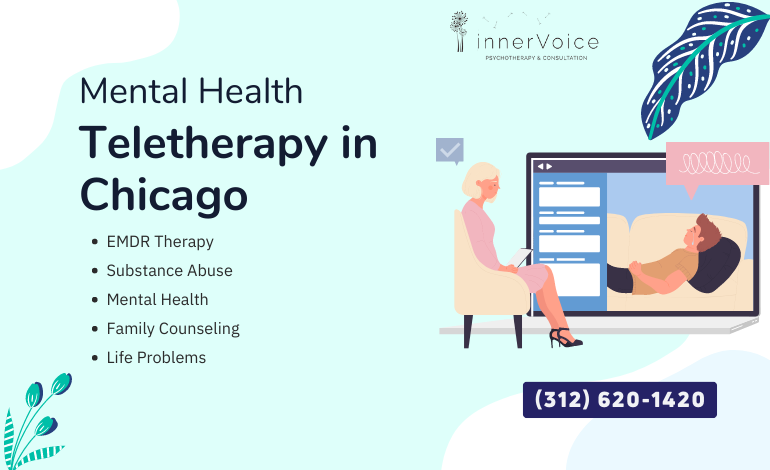Exploring the World of Teletherapy: A Comprehensive Guide

In today’s fast-paced digital age, the landscape of healthcare and mental well-being has transformed significantly, and teletherapy stands at the forefront of this revolution. As we delve into the realm of Chicago teletherapy, we uncover a world of possibilities, convenience, and effective treatment that bridges the gap between individuals seeking assistance and qualified professionals providing support.
Understanding Teletherapy: Breaking Down the Basics
Teletherapy, also known as online therapy or telehealth counseling, is a contemporary approach to delivering therapy services remotely through digital platforms. This mode of therapy enables individuals to connect with licensed therapists and mental health professionals via video calls, phone calls, or even text messages. The accessibility and convenience of teletherapy have revolutionized how people approach mental health support, breaking down barriers that once hindered access to therapy.
Benefits of Exploring the World of Teletherapy
Teletherapy comes with a host of benefits that make it a compelling option for those seeking mental health support:
Convenience and Accessibility
Exploring the world of teletherapy means unlocking the convenience of receiving therapy from the comfort of your own space. No more commuting to appointments or dealing with traffic – you can engage in therapy sessions at a time and place that suits your schedule.
Overcoming Geographical Barriers
Teletherapy bridges the gap for individuals living in remote areas or locations with limited access to mental health services. It brings qualified therapists to your screen, eliminating the need to travel long distances for a therapy session.
Anonymity and Reduced Stigma
Teletherapy offers a level of anonymity that some individuals find comforting. Engaging in therapy without fearing recognition in a waiting room can encourage those who might otherwise hesitate to seek help.
Diverse Therapist Options
When exploring the world of teletherapy, you gain access to a diverse range of therapists from around the globe. This means you have a greater chance of finding a therapist aligning with your needs and cultural background.
Flexibility for Busy Lifestyles
Modern life is often hectic, leaving little room for additional commitments. Teletherapy caters to busy individuals by providing flexible scheduling options, making it easier to prioritize mental health during a packed routine.
Effective for Various Concerns
Whether you’re dealing with anxiety, depression, relationship issues, or other mental health concerns, teletherapy has effectively addressed a wide range of emotional challenges.
Getting Started: Navigating Your Teletherapy Journey
Curious about how teletherapy works with psychotherapy and medication? Let’s explore the typical process:
- Research and Choose a Platform: Research reputable teletherapy platforms offering access to licensed therapists. Look for user reviews and ensure the platform follows strict confidentiality and security protocols.
- Sign Up and Profile Creation: Once you’ve chosen a platform, you must sign up and create a profile. This profile will include information about your concerns and preferences, helping the platform match you with a suitable therapist.
- Matching with a Therapist: Based on your information, the platform’s algorithm will check you with a therapist whose expertise aligns with your needs. You can typically review the therapist’s profile before making a decision.
- Scheduling Sessions: After choosing a therapist, you can schedule sessions that fit your availability. Many platforms offer various communication methods, such as video calls, phone calls, or text-based chats.
- Attending Sessions: The heart of teletherapy is the therapy sessions themselves. During these sessions, you’ll engage in meaningful conversations with your therapist, addressing your concerns and working towards your mental health goals.
- Homework and Activities: Some therapists might assign homework or activities to complete between sessions. These exercises help reinforce the concepts discussed during therapy and accelerate your progress.
- Progress Tracking: As you continue your teletherapy journey, you and your therapist will track your progress. This could involve assessing changes in your thoughts, behaviors, and overall well-being.
- Reassessment and Adjustment: Periodically, you and your therapist will reassess your goals and make any necessary adjustments to your treatment plan. This ensures that you’re consistently moving towards improved mental health.
Effectiveness and Considerations
Efficacy of Teletherapy
Numerous studies have highlighted the effectiveness of teletherapy. Research shows that online therapy can be as effective as in-person sessions, particularly for anxiety, depression, and stress-related disorders. The key lies in the strong rapport between the client and therapist, irrespective of the physical distance.
Ethical and Legal Considerations
While teletherapy offers numerous advantages, it’s essential to be aware of the ethical and legal considerations. Therapists must adhere to licensing regulations based on their jurisdiction and ensure the security and confidentiality of online communication platforms, and there are a few considerations to keep in mind:
- Internet Connectivity: A stable internet connection is crucial for seamless teletherapy sessions. Ensure you have a reliable connection to prevent disruptions during sessions.
- Confidentiality: Choose a platform that prioritizes confidentiality and employs encryption to protect your personal information.
- Comfort Level: Some individuals may take time to adjust to the format of teletherapy. Give yourself the freedom to acclimate to this new mode of therapy.
- Emergency Situations: Teletherapy might not be suitable for immediate crises. Have a plan in place for accessing emergency support if needed.
Is teletherapy effective for severe mental health disorders?
Teletherapy can be effective for various mental health concerns, including severe disorders. However, the suitability of teletherapy depends on the individual’s specific needs and the therapist’s assessment.
What about emergencies and crises?
Teletherapy might not be suitable for immediate crises. Individuals in trouble should have a plan for accessing local emergency resources or hotlines.
Can I trust the qualifications of online therapists?
Reputable teletherapy platforms ensure that therapists are licensed and qualified to provide mental health care. It’s important to choose media with transparent credential verification processes.
How is teletherapy right for me?
Consider your comfort level with technology, your preferences for communication, and your specific mental health needs. Some individuals benefit from the convenience of teletherapy, while others may prefer in-person interactions.
What if I experience technical difficulties during a session?
Technical glitches can happen, but most teletherapy platforms have support teams to assist with technical issues. It’s good practice to test your equipment before your session begins.
Does insurance cover teletherapy?
Insurance coverage for teletherapy varies depending on your insurance provider and your location. Some providers are increasingly offering coverage for online mental health services.
The Future of Mental Health Care: Embracing Change

As technology advances, teletherapy is poised to play an even more significant role in the future of mental health care. The convenience it offers and its effectiveness is gradually erasing the traditional boundaries of therapy. More research, innovation, and acceptance will likely shape teletherapy into a mainstream form of mental health support.
The Role of Teletherapy in the Future
Integration with Traditional Care
The future of mental health care is likely to see a harmonious integration of teletherapy with traditional in-person care. This hybrid model allows individuals to switch between formats based on their needs, preferences, and comfort levels.
Expansion of Services
As teletherapy gains wider acceptance, the range of services offered is expected to expand. Specialized therapy options, support groups, and workshops could become more accessible, catering to various mental health needs.
Advancements in AI and Virtual Reality
Artificial intelligence and virtual reality hold promise in enhancing the teletherapy experience. AI-driven tools could assist therapists in analyzing data and tailoring interventions. Virtual reality simulations could create immersive environments for exposure therapy, helping individuals confront their fears in a controlled setting.
Conclusion
In a world where connectivity knows no bounds, teletherapy emerges as a beacon of hope for individuals seeking support for their mental and emotional well-being. This comprehensive guide has taken you through teletherapy’s basics, benefits, and considerations, showcasing its potential to transform lives. As the future unfolds, it’s clear that teletherapy will continue to break barriers and provide solace to those in need.








